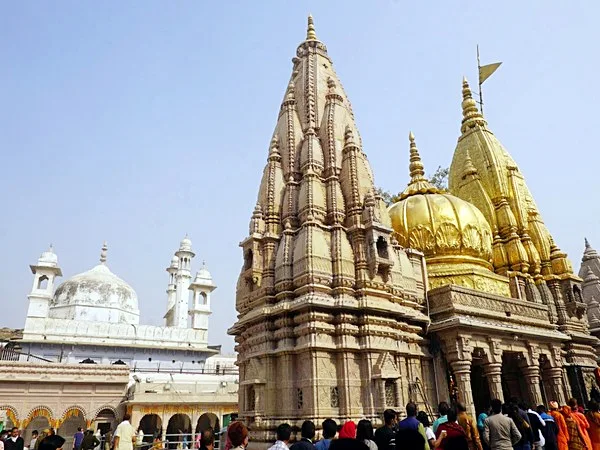A Varanasi Court on Monday agreed to hear a petition by five Hindu women seeking the right to worship in the compound of the Gyanvapi mosque located next to the famous Kashi Viswanath temple in the city.
The court dismissed the plea of Anjuman Islamia Masjid committee challenging the maintainability of the suit filed by the five women.
District Judge AK Vishvesh delivered the verdict in the Gyanvapi Shrinagar Gauri dispute case and posted the matter to further hearing on September 22.
“The court rejected the Muslim side’s petition and said the suit is maintainable. The next hearing of the case is on September 22,” said Advocate Vishnu Shankar Jain, representing the Hindu side in the Gyanvapi mosque case.
“It’s a win for the Hindu community. The next hearing is on Sep 22. It’s a foundation stone for the Gyanvapi temple. Appeal to people to maintain peace,” said Sohan Lal Arya, petitioner in the Gyanvapi case.
Earlier, the Hindu side had said that they will seek an Archaeological Survey of India (ASI) survey and carbon dating of ‘Shivling’ if the judgment comes in their favour.
Speaking to ANI, Advocate Vishnu Shankar Jain, representing the Hindu side said, “If the judgment comes in our favour, then we will seek for ASI survey, carbon dating of Shivling.”
A local Varanasi court ordered a videography survey of the complex earlier this year in May. The survey work was completed on May 16 and the report was presented in the court on May 19.
After the videography survey claims were made by the Hindu side that a structure, resembling a Shivling was found in the mosque complex but the Masjid committee contested that it was a fountain and not a Shivling.
“Several sculptures of gods and goddesses along with other structures related to Hindu belief were seen in the Gyanvapi Mosque in Varanasi,” said advocate Ajay Kumar Mishra, who was appointed commissioner by Varanasi court to survey the Gyanvapi-Gauri Shringar complex. Mishra was later removed for leaking the information.
The report claimed a “Shivling”, or relic of Lord Shiva, had been found in a pond within the mosque complex used for “Wazoo” or purification rituals before Muslim prayers.
A court then banned large Muslim prayer gatherings in the high-profile mosque. The gatherings should be limited to 20 people, said the court.
The filming inside the mosque was then challenged in the Supreme Court by the Gyanvapi mosque committee. The Muslim petitioners argued that “such petitions and sealing of mosques will lead to public mischief and communal disharmony, will affect mosques across the country.”
In May, the Supreme Court issued an order that the case be heard by a more senior judge in Varanasi because of the “complexity and sensitivity” of the dispute.
1998: Anjuman Intezamia Masjid Committee approached the Allahabad High Court that the temple-mosque land dispute could not be decided by a civil court as it was not permissible by the law. The High Court granted stay to the proceedings for 22 years.
Timeline: Gyanvapi – Kashi Vishwanath case
2019: The case was revived when a plea was filed on behalf of Swayambhu Jyotirlinga Bhagwan Vishweshwar as the deity’s next friend in the Varanasi court demanding a survey by ASI in the disputed area.
2020: Anjuman Intezamia Masjid Committee opposed the petition seeking ASI survey of the entire Gyanvapi complex.
2020: The petitioner approached the lower court for the resumption of the hearing of the 1991 petition.
March 2021: The Places of Worship Act 1991 was taken up by a Supreme Court bench headed by then former Chief Justice S.A. Bobde. The petitioner was Ashwani Upadhyay.
August 2021: Five female Hindu devotees filed a petition in the Varanasi Court seeking to worship deities Hanuman, Nandi, and Shringar Gauri, inside the Gyanvapi complex.
September 2021: Allahabad High Court said that the court should wait for further judgement in the already proceeding cases of the matter.
April 2022: Based on the petition filed in August 2021, the Varanasi district court appointed a court commissioner and videography survey of the complex. Anjuman Intezamia Masjid Committee challenged it in the Allahabad High court, which upheld the lower court order. The Masjid Committee also filed a Special Leave Petition in the Supreme Court.
May 6, 2022: The videographic survey of the complex began.
May 12, 2022: The court appointed senior advocate Vishal Singh to supervise the survey. He was appointed as special court commissioner. The court directed them to report details of the survey by May 17.
May 14-19, 2022: The survey was resumed again and was conducted for two days. All the survey findings were submitted in a report to the court.
May 20, 2022: The case proceedings were transferred to a district judge by the Supreme Court.
May 26, 2022: The district court began hearing the maintainability petition of the case.
June 21, 2022: Varanasi civil judge Ravi Kumar Diwakar, who had ordered the video survey of Gyanvapi mosque, is transferred to Bareilly.
July 11, 2022: The Hindu petitioners in the Gyanvapi case decide to form a new trust, Shri AdiMahadev Kashi Dharmalaya Mukti Nyas.
July 18, 2022: The Supreme Court agreed to list a plea seeking ‘puja’, ‘darshan’, ground penetrating radar (GPR) survey and carbon dating by the Archeological Survey of India (ASI) of the Shivling purportedly discovered in the Gyanvapi mosque’s ablution area during a court-ordered survey.
August 24, 2022: Varanasi Court reserved its order till September 12. The time was given to both parties to complete their arguments.
(With inputs from ANI)




















